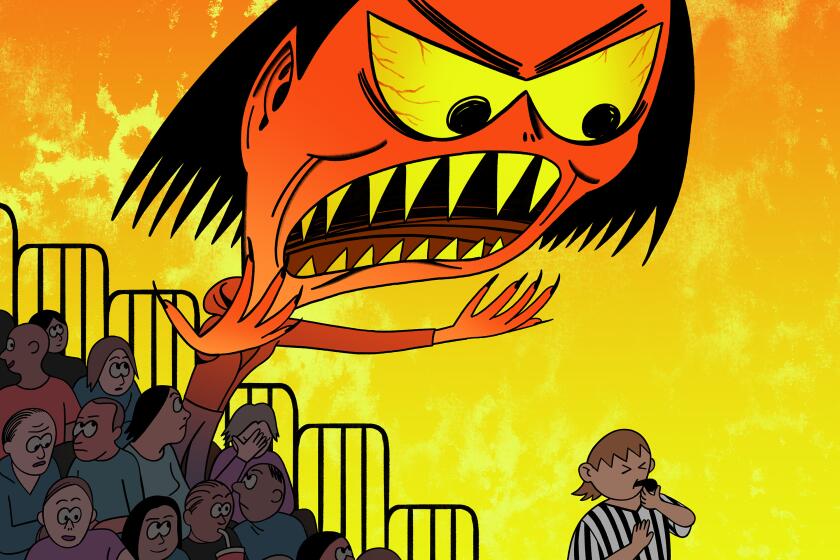
This column is the latest in a series on parenting children in the final years of high school, âEmptying the Nest.â Read the previous installment, about relearning how to be alone at home, here.
I recently saw a headline in the New York Times that I thought was the answer to my prayers: âAnxious Parents Are the Ones Who Need Help.â
Yes, please, I thought, hoping to find acknowledgment of all the very real forces that can turn any parent into an anxious mess.
Things like school shootings, worsening teen mental health, the ongoing debate over the danger of smartphones, the rising cost of a college education, the growing restrictions on female reproductive rights, the housing crisis, the opioid crisis, the fentanyl crisis and, of course, the climate crisis.
As I prepare to launch my third child out of the nest, my personal and parental anxiety is at a fever pitch; Iâll take any offer of help I can get.
Alas, it was not to be. The piece, written by a senior staff psychiatrist at Boston University Health Services, focused exclusively on parental anxieties that can arise during a childâs college experience, particularly freshman year.
In a tone as kind and generous as possible, the author advised parents to just try to detach and chill.
Itâs something parents hear all the time, when they are not being inundated with every type of story that can fit under the headline âThe Kids Are Not Alrightâ: Modern American parents need to stop trying to control every moment of their childrenâs lives and relax.
Wouldnât that be nice? To just, you know, let it all go and relax?
To be fair, I absolutely plan to relax, at least a little, once I have deposited my third and youngest child at the college of her choice.
(This may be wishful thinking. Her current top picks include three UCs, each with an average admission GPA of 4.0, and an out-of-state school that costs â as the young woman leading the orientation informed us with a completely straight face â $90,000 a year.)
After three kidsâ and 20 yearsâ worth of youth sports, columnist Mary McNamara reflects on the real reason parents yell at the refs and other lessons sheâs learned along the way.
After we sent our older kids to college, my husband and I left them to their own devices, which worked out just fine â though I can see why some parents feel justified in demanding that their child have a VIP college experience when the sticker price, as it is for Boston University, is $82,000.
But honestly, itâs the time before college that can turn even the most stoic, no-nonsense parent into an insomniac mess.
Because no one gets more dire warnings, eye-rolling criticism or conflicting information thrown at them than parents.
The kids, we are told repeatedly, are not doing well. They are depressed, they are anxious, they hate their bodies. They are addicted to their phones, donât know how to make friends, canât read or do math well enough and are easy prey for sexual predators and brainwashing extremists. They donât want to work, they canât find work, and the work they do find doesnât offer benefits and they canât afford to live close to it.
Try to prevent or mitigate any of the above and you risk being labeled neurotic, a âhelicopter parent.â Take a more hands-off approach and youâre accused of being uninvolved or neglectful.
Occasionally it is acknowledged that larger forces â gun violence; overcrowded schools stripped of arts and vocational programs; racism, sexism, homophobia; the unregulated force of social media â could be contributing factors in our childrenâs perceived problems.
More usually, however, the parents somehow shoulder the blame.
Either weâre not giving our children enough free time or weâre not monitoring what they do. Weâre too fixated on conventional definitions of success or weâre pressuring them to be unconventional. Weâre not allowing them to make their own mistakes and face the consequences or weâre not seeing signs of trouble early and getting them the help they clearly need.
All on our own, by the way. As research shows, the historic safety nets of extended family and involved community are increasingly frayed by mobility and the economic necessity of a two-income family, and nothing has been offered to replace them.
The pressure cooker of junior year hurts students and parents alike, columnist Mary McNamara writes in the first installment in a new series, âEmptying the Nest.â
If you can afford help, you are faced with inevitable criticism for putting your kids in daycare or âhanding them overâ to a nanny, a relationship that often raises issues of economic disparity, immigration status and racism.
And it doesnât end when the little geezers turn 18 or graduate from college. Parents of young adults are increasingly expected to force them to be independent while also either underwriting their rent/down payments or allowing them to return home.
But sure, parents are anxious because they are paranoid control freaks.
I love being a parent, and most of the time I simply ignore the endless criticism that has been spewed my way. You donât think I should breastfeed in public / put my kids in daycare / let them have sleepovers / give them smartphones /track those phonesâ locations / enroll them in club sports / encourage them to have birth control, Narcan and fentanyl testing strips on hand? I donât remember asking you.
And if you are not willing to come to my house and cook a meal or empty this damn dishwasher, I really donât want to hear it.
But in recent years, I have felt myself wilt, felt myself waver, felt myself surrender to all the studies and opinion pieces and become a big hot mess.
Perhaps it was the pandemic, which traumatized so many of us in so many ways. Perhaps itâs just because my youngest is, and always will be, the baby of the family. But I find myself beset by second-guessing.
She seems happy. Is that happiness real? Sheâs doing well in school. Is she too worried about grades? She has a job, participates in extracurriculars. Is her schedule too full? She has an active social life. Is wherever sheâs going safe? She seems a little down. Is she clinically depressed?
Itâs exhausting and slightly ridiculous: âDonât choke on the one-yard line,â I tell myself. In a few months, sheâll be 18; in a year, sheâll be out the door. But then what?
Iâm not a helicopter parent, a term I have come to loathe. But I am currently an anxious one. And you know what? Thatâs a perfectly reasonable thing to be.
More to Read
The biggest entertainment stories
Get our big stories about Hollywood, film, television, music, arts, culture and more right in your inbox as soon as they publish.
You may occasionally receive promotional content from the Los Angeles Times.













